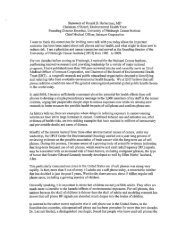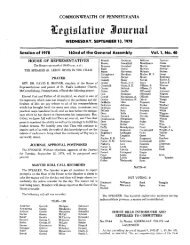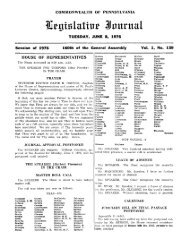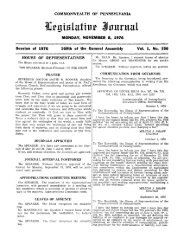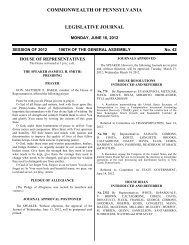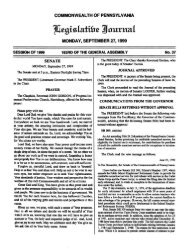commonwealth of pennsylvania - The Pennsylvania General Assembly
commonwealth of pennsylvania - The Pennsylvania General Assembly
commonwealth of pennsylvania - The Pennsylvania General Assembly
You also want an ePaper? Increase the reach of your titles
YUMPU automatically turns print PDFs into web optimized ePapers that Google loves.
1344 LEGISLATIVE JOURNAL-HOUSE JUNE 30,<br />
Mr. Speaker, I will explain my amendment and a current<br />
situation that needs correcting immediately. What we have is<br />
a situation where a municipal authority formed within one<br />
municipality acquires a private facility outside its boundary<br />
line. <strong>The</strong> problem we have is that there is no recourse for any<br />
ratemaking, any acquisition, or anything. All I am asking<br />
here is that the authority-and there is good reason in many<br />
cases for an authority to acquire another facility-all they<br />
have to do is notify the users, notify the municipality in which<br />
the other facility is located, and put a person on their board<br />
after the acquisition has taken place, one member. That is all<br />
it says here in this amendment. I would appreciate your<br />
support.<br />
<strong>The</strong> SPEAKER. On the question <strong>of</strong> the adoption <strong>of</strong> the<br />
amendments, the Chair recognizes the gentleman from<br />
Venango, Mr. Levi.<br />
Mr. LEVI. Mr. Speaker, I have to oppose this amendment.<br />
<strong>The</strong> first part <strong>of</strong> it, notifying and a public hearing, I think is<br />
quite right and proper. But 1 do not see why when an<br />
authority goes out and purchases another utility and goes<br />
through the public hearing process and everything, why they<br />
have to put somebody on the board. 1 think when you have<br />
your own operation and you purchase one that is in financial<br />
difficulty or for some other reason needs to sell, why do you<br />
have to take someone out <strong>of</strong> that outfit and put them on your<br />
board? I think it is well that you have a public hearing and<br />
public notice. I think that would be fine, but taking somebody<br />
from that area and putting them on your board and diluting<br />
the board <strong>of</strong> real efficient authority, I think, is wrong, and I<br />
would recommend we defeat this amendment.<br />
<strong>The</strong> SPEAKER. <strong>The</strong> Chair recognizes the lady from<br />
Delaware, Mrs. Durham.<br />
Mrs. DURHAM. Mr. Speaker, will Mr. Levi stand for<br />
interrogation?<br />
<strong>The</strong> SPEAKER. <strong>The</strong> gentleman, Mr. Levi, agrees to stand<br />
for interrogation. <strong>The</strong> lady may proceed.<br />
Mrs. DURHAM. Mr. Speaker, could you summarize why<br />
you are opposed to Mr. Wilson's amendment?<br />
Mr. LEVI. Mr. Speaker, my objection to this amendment is<br />
the last part <strong>of</strong> the amendment that requires the governing<br />
body <strong>of</strong> the old company or utility by placing somebody on<br />
the board <strong>of</strong> the company that is purchasing the old one. This<br />
dilutes the authority that is efficient in the running <strong>of</strong> a good<br />
operation by taking somebody in from the authority that for<br />
some reason got into difficulty and has to be absorbed. I just<br />
thing we are diluting it from people who are not running a<br />
good operation, and it is not in the best interest <strong>of</strong> all authori-<br />
ties.<br />
Mrs. DURHAM. Mr. Speaker, you do oppose this amend-<br />
ment. Is that correct?<br />
Mr. LEVI. Yes. It is not divisible, so, yes, I oppose the<br />
amendment.<br />
Mrs. DURHAM. Thank you.<br />
<strong>The</strong> SPEAKER. <strong>The</strong> Chair recognizes the gentleman from<br />
Allegheny, Mr. McVerry.<br />
Mr. McVERRY. Mr. Speaker, by law the governing body<br />
<strong>of</strong> a municipal authority are board members. Those board<br />
members are appointed to that position by the municipality<br />
that created the authority, who have the ultimate responsi-<br />
bility for the existence <strong>of</strong> that authority. <strong>The</strong>re is no reason-<br />
able reason or logical reason that I can see as to why that<br />
municipal authority, who is ultimately responsible to the<br />
municipality that created it, should be required to take onto<br />
its board a member <strong>of</strong> a facility that is being acquired by the<br />
authority who has the ultimate responsibility to see to the<br />
appropriate management <strong>of</strong> the authority. I urge a negative<br />
vote on the amendment, and I see no reasonable reason for it<br />
to be adopted. Thank you.<br />
<strong>The</strong> SPEAKER. <strong>The</strong> Chair recognizes the gentleman from<br />
Berks, Mr. Fryer. On the amendment, Mr. Fryer?<br />
Mr. FRYER. On the amendment.<br />
<strong>The</strong> SPEAKER. <strong>The</strong> gentleman is recognized.<br />
Mr. FRYER. Mr. Speaker, I would urge a "no" voteon the<br />
amendment.<br />
<strong>The</strong> SPEAKER. Does the gentleman from Somerset, Mr.<br />
Lloyd, wish to be recognized on the amendment?<br />
Mr. LLOYD. Yes, Mr. Speaker.<br />
<strong>The</strong> SPEAKER. <strong>The</strong> gentleman may proceed.<br />
Mr. LLOYD. Would the gentleman, Mr. Wilson, stand for<br />
brief interrogation?<br />
<strong>The</strong> SPEAKER. <strong>The</strong> gentleman indicates he will. <strong>The</strong><br />
gentleman, Mr. Lloyd, may proceed.<br />
Mr. LLOYD. Mr. Speaker, I want to understand exactly<br />
how this is going to work. If the municipal authority buys<br />
facilities outside the boundaries <strong>of</strong> the municipal authority, it<br />
then would have to place a former user or someone who is a<br />
user <strong>of</strong> those facilities outside the municipal authority on the<br />
authority board. Is that correct, Mr. Speaker?<br />
Mr. WILSON. No. If an acquiring authority goes outside<br />
the municipality that formed that authority to acquire another<br />
facility, it would have to agree to accept one person from that<br />
municipality as a vote on that authority so that it could handle<br />
condemnation, ratemaking, and all those things that that<br />
board would do and let its municipality know what is going<br />
on.<br />
Mr. LLOYD. Mr. Speaker, would it matter whether the<br />
number <strong>of</strong> users outside the municipal authority boundary<br />
was 10 or 1,000? <strong>The</strong>re would still be one member appointed.<br />
Is that correct, Mr. Speaker?<br />
Mr. WILSON. That is correct; only one. <strong>The</strong>y could<br />
acquire five different facilities in the municipality, but only<br />
one person would be named as a voting member and a repre-<br />
sentative <strong>of</strong> that municipality to report back to the munici-<br />
pality what is going on.<br />
Mr. LLOYD. So then, Mr. Speaker, if a municipal<br />
authority serves 5,000 people and wants to acquire some sewer<br />
lines or water lines which had been put there years ago which<br />
would serve 10 families outside the municipal authority, then<br />
the municipality outside the boundaries <strong>of</strong> the municipal<br />
authority would be entitled to one member on the municipal<br />
authority. Is that correct?<br />
Mr. WILSON. In the municipality where they have<br />
acquired any facilities, they would put one person on whether<br />
they were 10,000, 10 million people, or what. You know,




